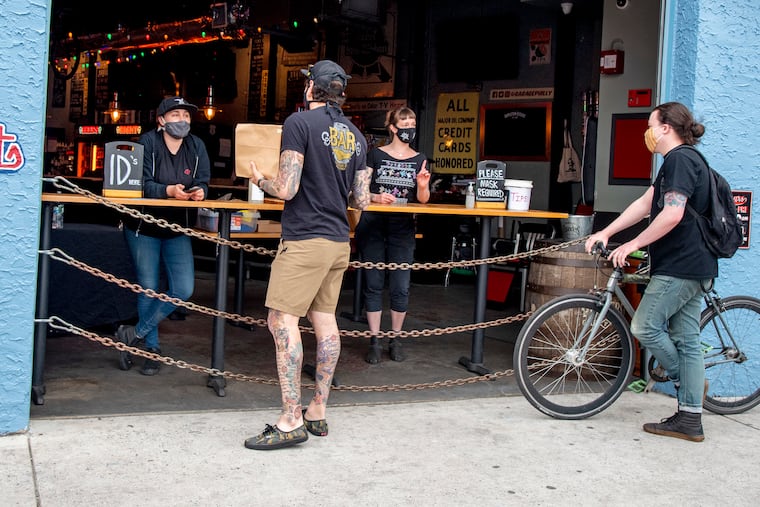Cocktails-to-go expected to be approved in Pennsylvania
"With the full reopening of bars not even on the table yet, this feels like our only shot," says one restaurateur.

Correction: An earlier version of this story said that Gov. Wolf had already signed legislation to approve cocktails-to-go. He is expected to sign the bill this week.
Pennsylvania bars and licensed restaurants will likely be able to sell cocktails for takeout soon.
In advance of Gov. Tom Wolf’s expected approval, bartenders prepared to pick up their shakers after two months and go to work. Though bar stools and dining room seats must still remain empty, business owners are hoping to see an income boost for a sector of the economy imperiled by the coronavirus shutdowns.
New Jersey on Friday approved similar legislation, allowing bars to sell cocktails of up to a pint for takeout or delivery.
Wolf said Tuesday that he would sign the bill.
“Honestly, this should have happened six weeks ago," said Nicole Marquis, who reopened Charlie was a sinner, her vegan cocktail bar in Center City Philadelphia, last Wednesday in anticipation of the signing, because drinks account for 55% of sales. “Restaurants and bars are the lifeblood of this city, and right now we’re bleeding out.... With the full reopening of bars not even on the table yet, this feels like our only shot."
Pennsylvania’s cocktail-to-go rule is intended as temporary, extending only until businesses are able to reach 60% of seating capacity. It applies to licensees with a restaurant (R) or hotel (H) license that have lost more than 25% of average monthly sales during the pandemic, and allows them to serve sealed containers of mixed drinks in servings of 4 to 64 ounces before 11 p.m. The drinks may not be delivered.
(It should be noted that Pennsylvania’s definition of “temporary” has wiggle room. The legislature passed a 10% tax on liquor sales to raise money for relief after the Johnstown flood of 1936. Fifteen years later, the tax was raised to 18% and was made permanent.)
Alcohol accounts for virtually all sales at many bars, and a sizable chunk of sales at restaurants. Beer sales have been allowed during the shutdown for takeout and delivery.
Not all bar owners are jumping at the chance to sell drinks to go. The rule says “meals” must be served. Rose Capozzoli at Ray’s Happy Birthday Bar in South Philadelphia, not known for any menu of substance, said she wants to see what others do before selling to-go drinks, since most of her business consists of $4 shot-and-beer specials. The 4-ounce drink minimum, she said, may throw things off — unless, she said with a laugh, “I do two shots.” Under the rule, “mixed drinks” may not be plain shots, however, and must be mixed on the premises.
The 4-ounce minimum was added to the bill by the House delegation from Philadelphia to prevent stop-and-go stores “from selling shots the wrong way,” said Chuck Moran, executive director of the Pennsylvania Licensed Beverage and Tavern Association, which helped draft the bill.
“Operating a takeout-only model is not sustainable for many restaurants; however, this legislation provides another tool for licensees to weather the challenges this crisis has presented,” said John Longstreet, who heads the Pennsylvania Restaurant and Lodging Association. The legislation received bipartisan support: Rep. Kurt Masser, a Republican who serves Montour and parts of Northumberland and Columbia Counties, championed the issue, which started as a reform bill introduced by Rep. Perry Warren, a Democrat who represents part of Bucks County.
Drinks must be sold in a sealed container, which simply means that a cup with sipping holes or an opening for straws must be capped with an additional seal.
Many bars and restaurants are selling mixed drinks out of plastic takeout containers that might otherwise be used for soup or rice. Others use disposable pouches resembling intravenous bags. John Brandt-Lee, owner of Avalon in Bryn Mawr and West Chester, labels his “the Fauci Pouchy,” after the director of the National Institute of Allergy and Infectious Diseases.
Five years ago, Jason Evenchik, who owns a half-dozen bars and restaurants, bought the trademark for the name “Fun Bags” from a Wisconsin winery and was among the first publicans in the area to sell drinks in pouches at the bar. The location of Garage Passyunk at Ninth Street and Passyunk Avenue, across from takeout cheesesteak meccas Pat’s King of Steaks and Geno’s, may put Evenchik’s business at an advantage. (For the record, Garage’s idea of food is Cup Noodles — your choice of pork, shrimp, or chicken.)
Which raises another issue: Open containers of alcohol are still prohibited in Pennsylvania. “They should save the drink for consumption on private property,” said Moran, of the tavern owners’ group. “We don’t want people walking down the street drinking one.”
The Distilled Spirits Council of the United States said 33 states plus the District of Columbia now allow restaurants and/or bars to sell cocktails to go, bottled spirits to go, or both.